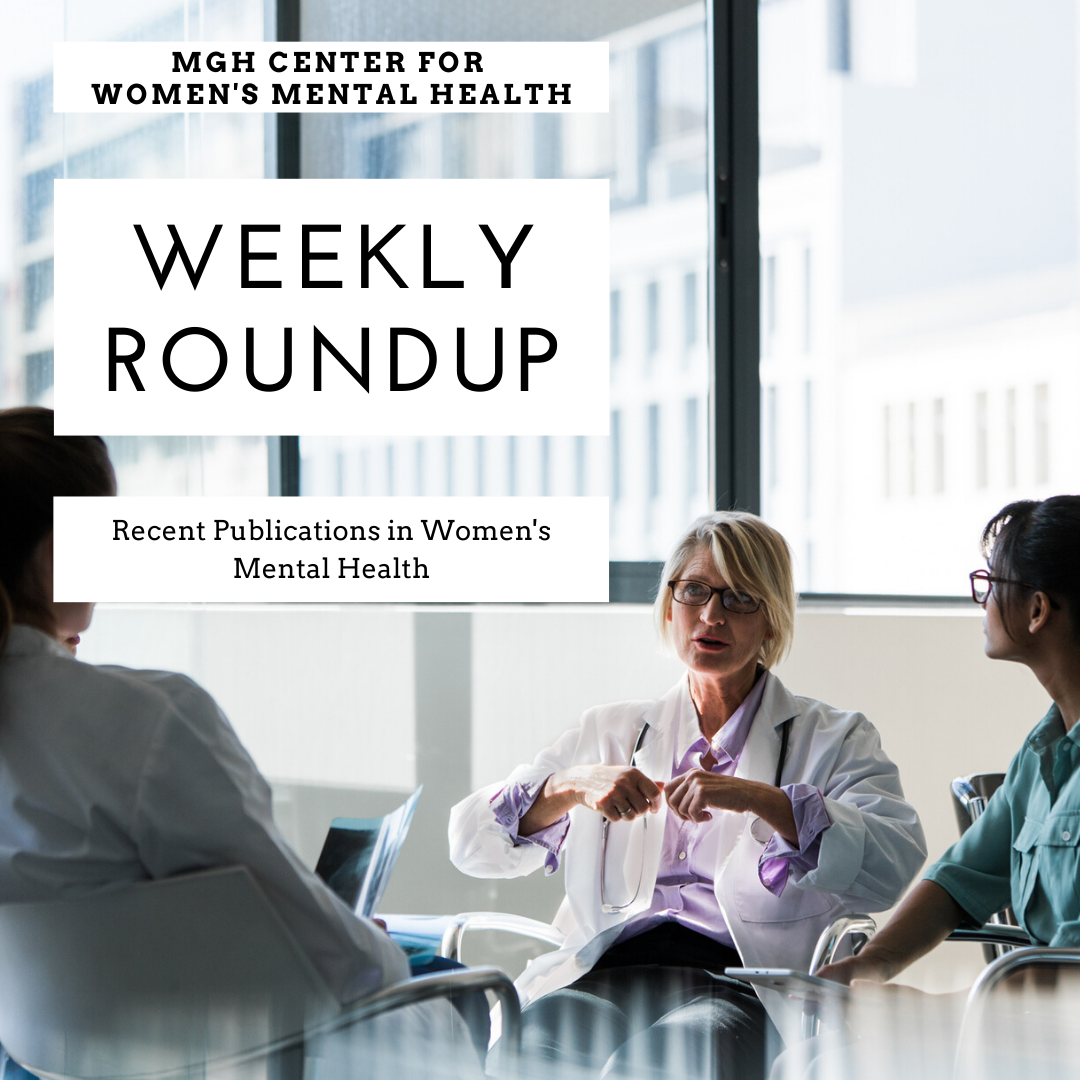Every week we review the most recent publications in women’s mental health, covering topics related to premenstrual symptoms, perinatal mood and anxiety disorders, use of medications in pregnant and breastfeeding women, perinatal substance use, and menopausal mental health.
In a meta-analysis including nearly 200,000 mother-infant dyads, Rogers and colleagues look at the impact of perinatal depression on the child development, noting a negative impact of perinatal depression on social-emotional, cognitive, language, motor, and adaptability outcomes in offspring during the first 18 years of life. What makes this study special is that it includes such a large number of children and that it follows the children over a longer period of time. We will discuss this study in greater detail next week.
There is also a very interesting article from Gordon-Smith and colleagues which looks at postpartum symptoms in women with bipolar disorder, noting that classic mania is uncommon in this setting. Rather women with bipolar disorder are more likely to present with more depressive or mixed symptoms.
For more detailed descriptions of many of these topics, you can sign up to receive our weekly CWMH NEWSLETTER which comes out every Thursday.
Ruta Nonacs, MD PhD
PMS AND PMDD |
| No articles this week
|
INFERTILITY AND MENTAL HEALTH |
| No articles this week
|
PSYCHIATRIC ILLNESS DURING PREGNANCY |
| Depressed mood and anxiety as risk factors for hypertensive disorders of pregnancy: a systematic review and meta-analysis.Shay M, MacKinnon AL, Metcalfe A, Giesbrecht G, Campbell T, Nerenberg K, Tough S, Tomfohr-Madsen L. Psychol Med. 2020 Sep 11:1-13.
Women experiencing depression or anxiety in pregnancy have an increased prevalence of hypertension during pregnancy compared to their non-depressed or non-anxious counterparts. Shigemi D, Ishimaru M, Matsui H, Fushimi K, Yasunaga H. J Clin Psychiatry. 2020 May 5;81(3):19. The prevalence of suicide attempts was significantly higher among postpartum women (6.2%) than among pregnant women (0.7%; P < .001). Postpartum patients were more likely to be aged 30 years or older and to have depression. Wrist cutting was the main method of suicide attempt among pregnant patients, whereas hanging was the main method among postpartum patients. Three postpartum patients died during hospitalization.
|
MEDICATIONS AND PREGNANCY |
| No articles this week
|
POSTPARTUM PSYCHIATRIC ILLNESS |
| Association between Delivering Liveborn Twins and Acute Psychiatric Illness within One Year of Delivery.
Lewkowitz AK, LÓpez JD, Keller M, Rosenbloom JI, Macones GA, Olsen MA, Cahill AG. Am J Obstet Gynecol. 2020 Sep 11. Overall, diagnostic codes for psychiatric illness or substance misuse in ED visits or hospital admissions in the year after delivery is similar after twins and singletons. Postpartum psychosis: an important clue to the etiology of mental illness. Jones I. World Psychiatry. 2020 Oct;19(3):334-336. Morris E, Slomp C, Hippman C, Inglis A, Carrion P, Batallones R, Andrighetti H, Austin J. J Obstet Gynaecol Can. 2019 Sep;41(9):1330-1337. These data provide no support for the idea that postpartum placentophagy improves mood, energy, lactation, or plasma vitamin B12 levels in women with a history of mood disorders Machine Learning-Based Predictive Modeling of Postpartum Depression.Shin D, Lee KJ, Adeluwa T, Hur J. J Clin Med. 2020 Sep 8. Data from the Pregnancy Risk Assessment Monitoring System 2012-2013 with 28,755 records (3339 postpartum depression and 25,416 normal cases) was used to model risk for postpartum depression. The best algorithm achieved the highest area under the receiver-operating-characteristic curve (AUC) value of 0.884. Gordon-Smith K, Perry A, Di Florio A, Forty L, Fraser C, Casanova Dias M, Warne N, MacDonald T, Craddock N, Jones L, Jones I. Psychiatry Res. 2020 Feb;284:112748. Postpartum manic episodes had a significantly higher incidence of perplexity and excessive self-reproach. Classic manic symptoms, specifically pressured speech and increased sociability, were significantly less frequent in postpartum manic episodes. Overall there were significantly fewer manic symptoms and significantly more depressive symptoms in the postpartum episodes than in the non-postpartum episodes.
|
MEDICATIONS AND BREASTFEEDING |
| No articles this week
|
PERINATAL SUBSTANCE USE |
| No articles this week
|
MATERNAL MENTAL HEALTH AND CHILD OUTCOMES |
| Association Between Maternal Perinatal Depression and Anxiety and Child and Adolescent Development: A Meta-analysis.
Rogers A, Obst S, Teague SJ, Rossen L, Spry EA, Macdonald JA, Sunderland M, Olsson CA, Youssef G, Hutchinson D. JAMA Pediatr. 2020 Sep 14. In a meta-analysis including 195,751 unique mother-child dyads, maternal perinatal depression and anxiety were associated with poorer offspring social-emotional, cognitive, language, motor, and adaptive behavior development. Maternal Anxiety and Depression during Late Pregnancy and Newborn Brain White Matter Development. Graham RM, Jiang L, McCorkle G, Bellando BJ, Sorensen ST, Glasier CM, Ramakrishnaiah RH, Rowell AC, Coker JL, Ou X. AJNR Am J Neuroradiol. 2020 Sep 10. Higher maternal anxiety and depression symptom scores during late pregnancy were associated with lower estimated infant brain WM development, which indicated in utero influences of maternal mental health during pregnancy on the developing brain. |
MENOPAUSE AND MENTAL HEALTH |
| No articles this week
|
OTHER TOPICS IN WOMEN’S MENTAL HEALTH |
| No articles this week |




Leave A Comment